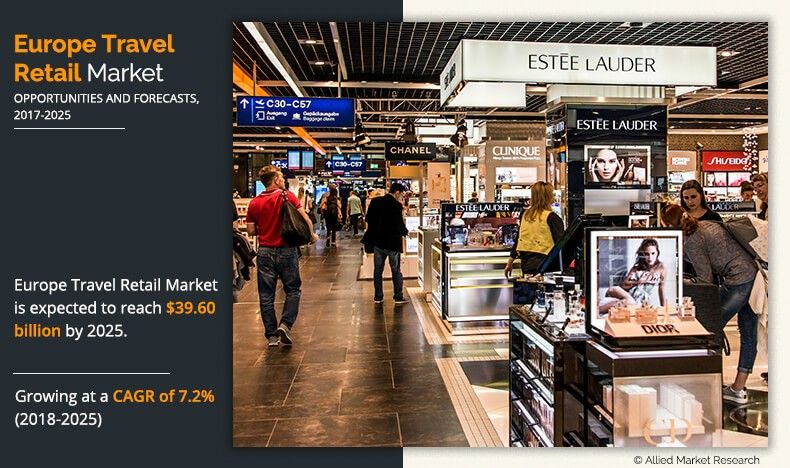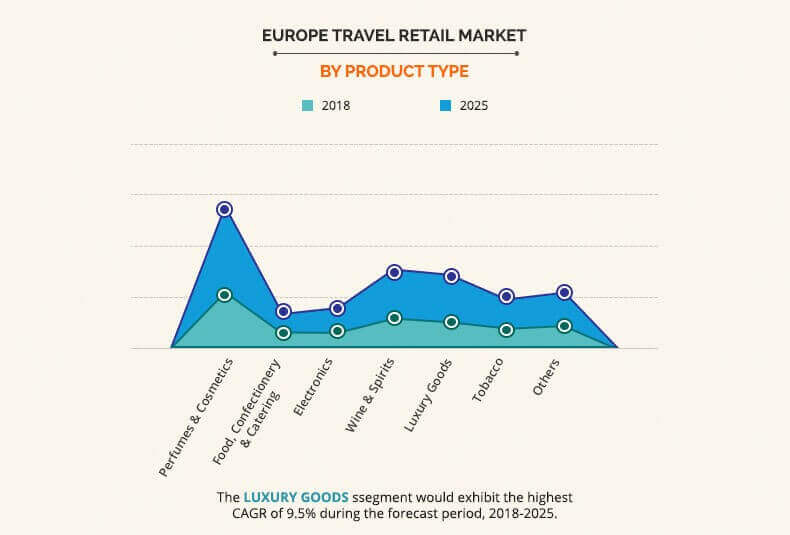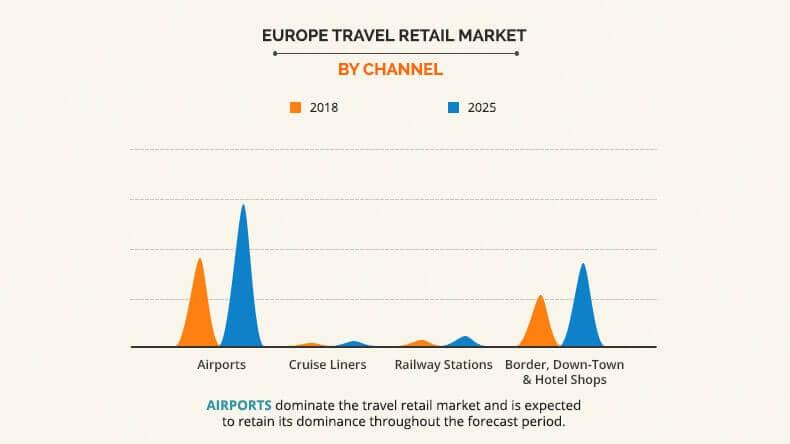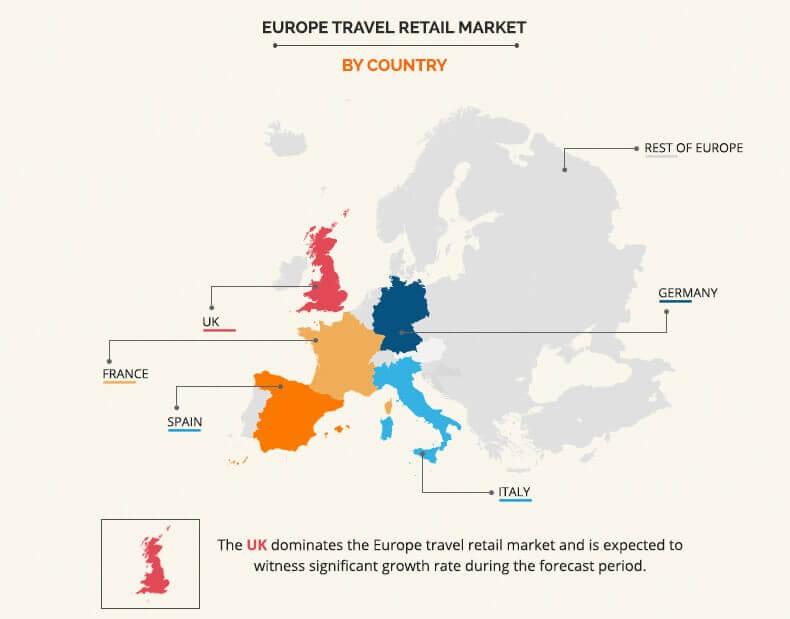The Europe Travel Retail Market Outlook - 2025
The Europe travel retail market size was valued at $23.03 billion in 2017, and is projected to reach $39.60 billion by 2025, growing at a CAGR of 7.2% from 2018 to 2025.
The report focuses on the growth prospects, restraints, and trends of the Europe travel retail market analysis. Rise in disposable income has improved the consumer lifestyle and helped shift their preference toward apparels, luxury goods, premium fragrances, cosmetics, and other products. However, stringent government regulations in airport retailing are expected to hamper the Europe travel retail market growth.
The travel & tourism sector includes leisure tourism, business tourism, medical tourism, and others. The factors that promote the growth of the travel & tourism industry include changes in lifestyle, rise in tourism promotion, increase in accessibility of transport facilities, and others, which in turn are expected to fuel the growth of the travel retail market. Factors such as technological advancements, give rise to easy access to hotel & transport booking through online portals, which further boost the growth of the Europe travel retail industry. Continuous development in the travel & tourism industry and integration of various segments such as hospitality & infrastructure with government initiatives, boost the travel & tourism industry, which in turn supplements the growth of the travel retail market. The travel & tourism industry is one of the biggest sectors across the globe. The international tourist arrivals have increased from around 308.5 million in 1995 to 605.1 million to 2015 to 671.7 million in 2017.
The stringent baggage rule for air travel passengers is projected to hamper the travel retail market. For instance, Turkish Airlines allows a handbag weighing not more than eight kgs while the luggage is limited up to 32kgs. Moreover, Lufthansa permits its passengers to follow a baggage allowance of not more than 32–40kgs. The restrictions on baggage at airports restrains the passengers from buying products from the airport malls or stores, thereby hampering the growth of the market.
Increase in terrorism and crime rate has a negative impact on travel & tourism and thus, simultaneously affects the travel retail market. Earlier, the targets of terrorists were politicians and chiefs of the defense sector; however, now the target has shifted toward international tourists and visitors. Some of these infamous incidents include The Luxor massacre, November 1997; 9/11 at the World Trade Center; and 26/11 Mumbai attacks among several others. These incidents have severely affected the travel & tourism industry. Moreover, massacres such as 9/11 had a high impact on the travel retail market. For instance, Victorinox lost 40% of its business post 9/11 as its key product for travel retail included Swiss Knives. that were banned at all airports & airlines.
Moreover, surge in number of crime rates, such as kidnaping, pickpocket, robbery, and others, has led to instability in tourist destinations. In 2016, France witnessed more than 25% drop in Chinese tourists, more than 35% drop in Japanese tourists, and more than 25% drop in Korean tourists.
Based on product, the Europe travel retail market is segmented into luxury goods, wine & spirits, electronics, food & confectionery, tobacco, perfumes & cosmetics, and others. The perfumes & cosmetics segment has a very strong retail marketplace at airport malls, downtown hotel shops, and thus, generated the maximum revenue in 2017 and is projected to rise at a notable growth rate. However, the luxury goods travel retail market is anticipated to witness steady demand in the developed regions owing to early adoption of premium lifestyle and has a huge growth potential in the emerging markets. Rise in disposable income, exposure to social media, urbanization, and preference toward investments on personal luxury goods are some factors that propel the growth of the market.
Based on channel, the Europe travel retail market is segmented into airports, cruise liners, border, down-town, & hotel shops, and railway stations. Airport retailing is one of the biggest retailing sectors in the international travel retail market. The airport retail stores are commonly found at departures, arrivals, and airside. The airport travel retail market is largely driven by rise in air traffic, expansion of airport infrastructure, and high customer demand for luxurious products. Thus, the airport segment generated the maximum revenue in 2017 and is expected to grow at a considerable growth rate during the forecast period.
As per country, the Europe travel retail market share is analyzed across the UK, Germany, France, Spain, Italy, and rest of Europe. Europe is one of the largest travel retail industries owing to its stronger base of luxury products. The region possesses some of the biggest apparels and cosmetic brands, namely LVMH from France and H&M from Sweden, which hold a significant share in the luxury apparels, perfumes, and cosmetics sector, thereby making it one of the largest travel retail markets in 2017. Wealthy tourists from the Middle East, China, the U.S., and Russia continue to contribute a significant part in the market.
The report offers a comprehensive analysis of the key players such as Autogrill S.p.A., daa Plc., Dufry AG, Flemingo International Ltd., Gebr. Heinemann SE & Co. KG, Lagardère SCA, LVMH Group, RegStaer, TRE³, and WH Smith PLC.
The Europe travel retail industry is highly competitive. Major players have adopted expansion as the key strategic move to sustain in the market. For instance, in October 2018, Dufry opened a duty-free store at Norwich airport to improve passenger communication. In March 2017, Dufry’s subsidiary “Hellenic Duty-Free Shops” and Fraport Greece signed an agreement. According to this agreement Dufry is expected to operate for 30 years to deliver retail services at 14 Greek airports. Detailed, current and future Europe travel retail industry trends are outlined to determine the overall attractiveness of the market.
Key Benefits for Europe Travel Retail Market:
- This study presents the analytical depiction of the Europe travel retail market trends and future estimations to determine the imminent investment pockets.
- A detailed analysis of the Europe travel retail market segments measures the potential of the market. These segments outline the favorable conditions for the market forecast.
- Europe travel retail market forecasts are offered along with information related to key drivers, restraints, and opportunities.
- The current Europe travel retail market is quantitatively analyzed from 2018 to 2025 to highlight the financial competency of the industry.
- Porter’s five forces analysis illustrates the potency of buyers & suppliers in the industry.
Europe Travel Retail Market Report Highlights
| Aspects | Details |
| By Product Type |
|
| By CHANNEL |
|
| By Country |
|
| Key Market Players | WH SMITH PLC., TRE³, AUTOGRILL S.P.A, GEBR. HEINEMANN SE & CO. KG, LAGARDÈRE SCA, DAA PLC., FLEMINGO INTERNATIONAL LTD., DUFRY AG, LVMH GROUP (DFS GROUP LIMITED), REGSTAER |
Analyst Review
The travel retail market has witnessed steady growth in the recent years. Europe is one of the largest travel markets in the world. The adoption of branded & premium clothing, exotic fragrances, and organic skincare products witnessed significant growth, owing to increase in population and economic stability.
The Europe travel retail industry is segmented based on channel into airports; cruise liners; railway stations; and border, downtown, & hotel shops. Airport retailing is one of the largest retailing sectors in the travel retail market. The airport segment generated the maximum revenue in 2017, and is expected to grow at a considerable growth rate during the forecast period, owing to rise in air traffic, development of airport infrastructure, and increase in demand for luxurious products among customers. However, the use of border, downtown, & hotel shops is one of the most efficient ways of creating brand awareness among consumers as well as increase in general sales, as it allows customers to view and purchase products without any hassle and inconvenience. Therefore, brands such as Prada, Gucci, H&M, and others, are increasingly launching their hotel shops to make it easier for customers to view and purchase products, thereby experiencing rapid growth in the travel retail market.
Loading Table Of Content...







